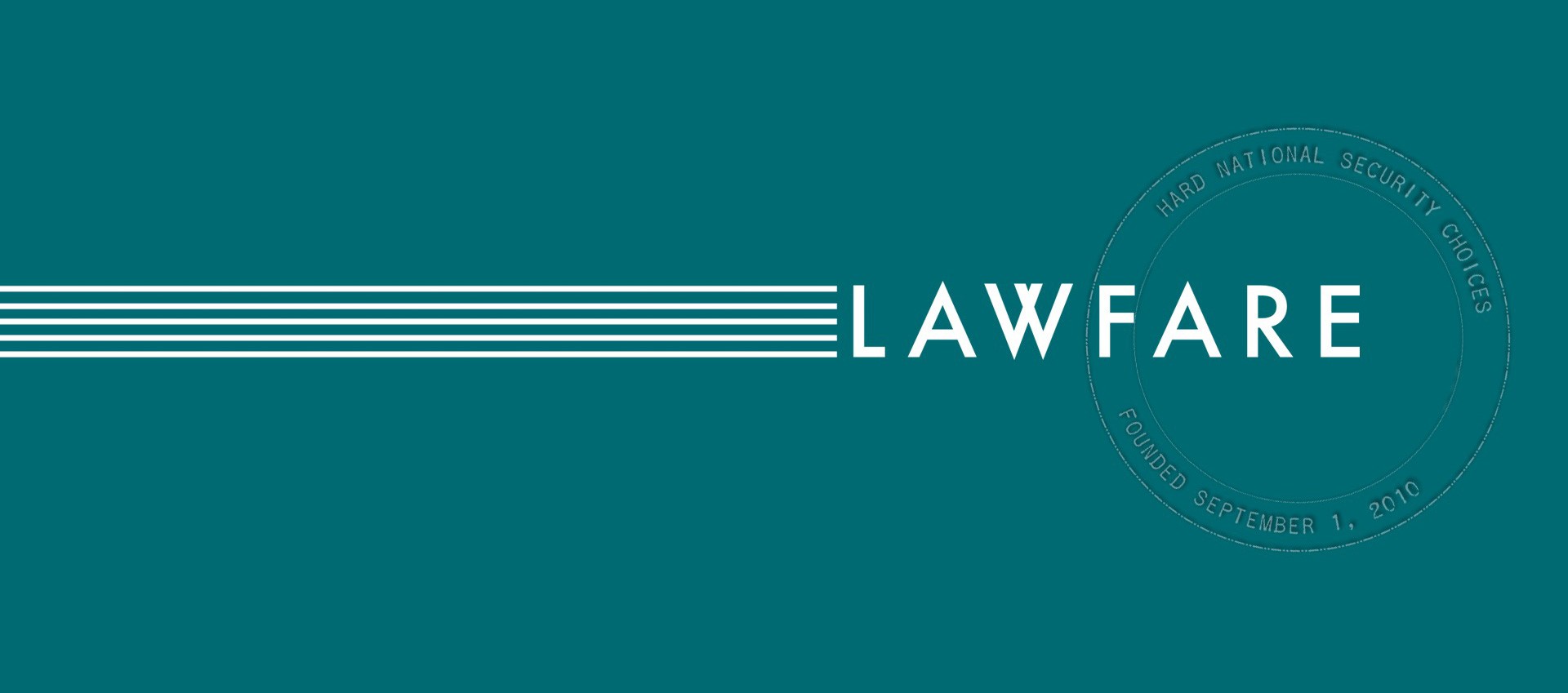The Week That Was: All of Lawfare in One Post

Published by The Lawfare Institute
in Cooperation With

Tyler McBrien reported on the first two days of former President Donald Trump’s New York hush money trial from inside the courtroom, where Justice Juan Merchan oversaw the jury selection process.
On the Lawfare Podcast, Katherine Pompilio sat down with Anna Bower, McBrien and Roger Parloff to discuss the first criminal trial of Trump in New York, where he faces 34 felony counts for his alleged falsification of business records related to hush money payments to Stormy Daniels and others after the 2016 election. They discussed the case’s background, Trump’s various attempts to delay the proceedings, how jury selection has worked, Lawfare’s plans for covering the trial, and more:
Also on the Lawfare Podcast, Quinta Jurecic sat down with Bower and Parloff to talk about the jury selection in the case against Trump in New York City and Judge Aileen Cannon’s ruling on whether to unseal witness names in the case against Trump in Florida. They also checked in on Fulton County to see what District Attorney Fani Willis was up to, talked about Jack Smith's Supreme Court brief regarding Trump's presidential immunity defense, and more:
On April 18, Benjamin Wittes sat down with Parloff and McBrien for this week’s episode of “Lawfare Live: Trump’s Trials and Tribulations.” If you couldn’t attend the live event, the recording is available on Lawfare’s YouTube channel or over the weekend on the Lawfare Podcast feed:
On the Lawfare Podcast, Wittes spoke to Matt Olsen about the House’s overhaul and reauthorization of the Foreign Intelligence Surveillance Act (FISA) 702 program, a bill which now heads to the Senate for final passage. They talked about the new constraints it imposes on the Justice Department and the FBI, what it doesn't do, the warrant requirement that isn't there, and more:
Preston Marquis and Molly Reynolds examined the Reforming Intelligence and Securing America Act to reauthorize Section 702 of FISA and its arduous journey in the House.
On another episode of the Lawfare Podcast, Wittes sat down with Stephanie Pell, Reynolds, and Marquis to discuss the House’s success in passing legislation to reauthorize Section 702 of FISA. They talked about how the folks in the center beat the coalition of those on the left and right on the key question of warrant requirements for U.S. person queries, whether the civil liberties community gained anything in this protracted process or whether the administration just “kicked its butt,” and more:
Manal Cheema and Ariel Sarandinaki examined the U.S. Navy’s use of unmanned surface vessels (USVs) in the Western Pacific. Cheema and Sarandinaki explained how the vessels are classified, international law regarding “unmanned” ships, and who (the USV itself or its remote commanding officer) bears responsibility for any potential harmful conduct.
In the latest installment of Water Wars, Aaron Baum, Teresa Chen, Alana Nance, Nikhita Salgame, and Ania Zolyniak discussed several incidents near the Kinmen archipelago resulting in the deaths and ongoing rescue of several Chinese fisherman and crew members, the United States’s signals of support for Taiwan, the Philippine Maritime Zones Act, and more.
On the Lawfare Podcast, McBrien sat down with Reva Dhingra and Ciarán Donnelly to talk about the immense death toll and humanitarian cost of the war in Sudan. They discussed the roots of the current conflict and the spillover effects, what Donnelly saw on his recent trip to the Sudan-Chad border, climate change and more:
In this week’s installment of Lawfare’s Foreign Policy Essay series, Donnelly and Dhingra discussed the ongoing war and humanitarian crisis in Sudan, and explained why the international community should reform its approach to humanitarian aid in the country. As first steps to address the humanitarian consequences of the war, they recommended increased diplomatic engagement, support for neighboring refugee-hosting communities, and greater inclusion in climate adaptation financing.
On Rational Security, Alan Rozenshtein and Jurecic were joined by Wittes to talk through the week’s big national security news. They discussed the retaliatory Iranian drone and missile strikes against Israel in response to the attack in Syria that killed several high-ranking Iranian military officers, the war in Gaza six months in, the recent oral argument heard by the Supreme Court in Fischer v. United States which relates to the Jan. 6 attack on the Capitol, and more:
Siena Cicarelli and Erin Sikorsky argued that during the upcoming Spring Meetings, the World Bank should include food security as an agenda item, as it undoubtedly intersects with climate change. Cicarelli and Sikorsky further considered reforming the climate finance system to structurally include adaptation in addition to mitigation in order to address the broader challenges in the food and climate crisis.
On the Lawfare Podcast, Matt Gluck spoke to Sara Moller about the 75th birthday of NATO, its current and likely future posture, its role in the war in Ukraine and in the Indo-Pacific, and more.
Christina Knight reviewed Yashen Huang’s book, “The Rise and Fall of the EAST: How Exams, Autocracy, Stability, and Technology Brought China Success, and Why They Might Lead to Its Decline,” on the tension between “scale” and “scope” that China has grappled with for centuries.
Julie E. Cohen reviewed Anu Bradford’s book, “Digital Empires: The Global Battle to Regulate Technology,” which considered the struggle among world powers which aim to align the growth of digital technology with their own interests.
Matthew Tokson explained how a case involving a geofence warrant served to Google could undermine Fourth Amendment protections for location data, and also threaten future protections for most other types of cell phone data.
John Speed Meyers and Paul Gibert offered counterclaims to three widely-held beliefs in the debate about the liability-related obligations of companies and open source software developers regarding open source software in products.
In the latest edition of the Seriously Risky Business cybersecurity newsletter, Tom Uren discussed a data breach impacting Sisense, a data analytics company, a recently launched AI election interference tracker, the use of Pegasus by the former Polish government to spy on its opposition, and more.
On Chatter, David Priess sat down with Virgina Postrel to discuss various aspects of the economics, history, global effects and societal context of fashion, glamor, and consumer choice, which her book “The Fabric of Civilization,” tackles. They talked about the value of purple in the Roman Empire, the importance of fabrics for outfitting armies and making warships' sails, how textile merchants led to the modern political economy, Jackie Kennedy, and more:
And on April 3, Lawfare announced another auction item on the Givebutter campaign—the “Black Hole of Awful” Post-It by Jurecic, one-of-a-kind Lawfare sketch born from a conversation with Wittes that illustrates the extent to which trial delay is advantageous to Trump. Other items of exclusive Lawfare merchandise up for auction include an autographed Lawfare jigsaw puzzle and Wittes’s Twitter sensation and protector of democracy #BabyCannon. Place your bids to support Lawfare’s Trump Trials coverage. You can also support Lawfare’s Trump Trials coverage by making a contribution here.
And that was the week that was.



